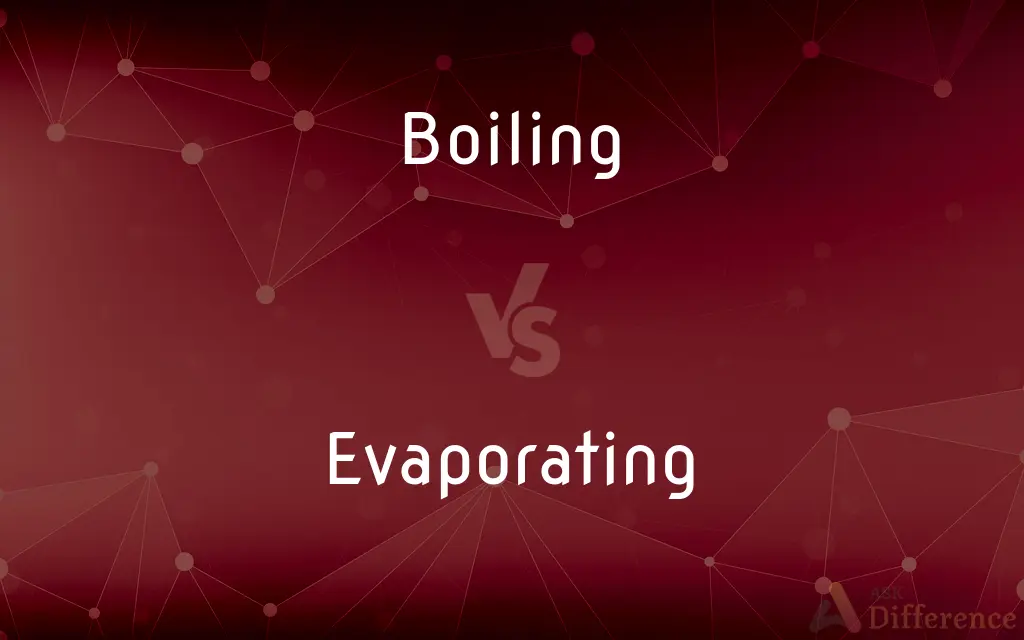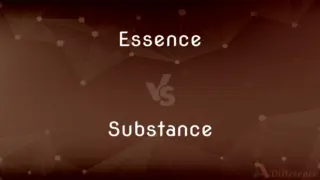Boiling vs. Evaporating — What's the Difference?
By Tayyaba Rehman — Published on October 5, 2023
Boiling is the process where a liquid turns into a vapor by heating it to its boiling point, often producing bubbles. Evaporating is the gradual change of a liquid into vapor at any temperature, usually at the surface.

Difference Between Boiling and Evaporating
Table of Contents
ADVERTISEMENT
Key Differences
Boiling is the phase transition that occurs when a liquid is heated to its boiling point, causing it to vaporize rapidly and usually form bubbles. Evaporating, on the other hand, is a slower process that occurs when liquid turns into vapor without necessarily reaching its boiling point.
Tayyaba Rehman
Oct 05, 2023
From a grammatical perspective, both "boiling" and "evaporating" function primarily as present participle forms of the verbs "to boil" and "to evaporate." However, "boiling" can also be a noun as in "the boiling of water," while "evaporating" is less commonly used as a noun.
Tayyaba Rehman
Oct 05, 2023
In boiling, the entire volume of the liquid is involved, and you'll often observe bubbles forming and rising to the surface. Evaporating is typically a surface phenomenon, where the liquid slowly turns into vapor at the exposed surface without the formation of bubbles.
Tayyaba Rehman
Oct 05, 2023
Boiling is often an intentional act done for cooking, sterilization, or distillation, requiring an external heat source to reach the boiling point. Evaporating is a more natural process that occurs over time, often facilitated by environmental factors like heat and wind but doesn't necessarily require an external heat source.
Tayyaba Rehman
Oct 05, 2023
Comparison Chart
ADVERTISEMENT
Definitions
Boiling
A physical change requiring a defined boiling point.
The boiling point of water is 100°C at sea level.
Tayyaba Rehman
Sep 19, 2023
ADVERTISEMENT
Evaporating
The gradual turning of liquid into vapor.
Evaporating water left the bowl dry.
Tayyaba Rehman
Sep 19, 2023
Boiling
Rapid vaporization through the application of heat.
Boiling is a quick way to sterilize water.
Tayyaba Rehman
Sep 19, 2023
Evaporating
Slow vaporization often influenced by environmental factors.
The evaporating puddle was gone by noon.
Tayyaba Rehman
Sep 19, 2023
Boiling
A vigorous phase change often used for cooking or cleaning.
Boiling the utensils killed all the germs.
Tayyaba Rehman
Sep 19, 2023
Evaporating
A surface phenomenon not requiring a specific temperature.
The water started evaporating as soon as it was exposed to the sun.
Tayyaba Rehman
Sep 19, 2023
Boiling
A process involving bubble formation in a heated liquid.
I could see the boiling in the pot.
Tayyaba Rehman
Sep 19, 2023
Evaporating
Loss of liquid to the atmosphere.
Evaporating moisture is common in arid climates.
Tayyaba Rehman
Sep 19, 2023
Evaporating
A phase change not necessarily needing an external heat source.
The perfume was evaporating quickly.
Tayyaba Rehman
Sep 19, 2023
Boiling
Used as an intensive
Fainted because it was boiling hot.
Boiling mad over the mistake.
Tayyaba Rehman
Sep 17, 2023
Evaporating
To draw moisture from, as by heating, leaving only the dry solid portion.
Tayyaba Rehman
Sep 17, 2023
Boiling
The process of changing the state of a substance from liquid to gas by heating it to its boiling point.
Tayyaba Rehman
Sep 17, 2023
Boiling
(uncountable) An animation style with constantly changing wavy outlines, giving a shimmering or wobbling appearance.
Tayyaba Rehman
Sep 17, 2023
Boiling
Of a thing: extremely hot or active.
The radiator is boiling – I’m going to turn it down a bit.
Tayyaba Rehman
Sep 17, 2023
Boiling
Of a person: feeling uncomfortably hot.
I’m boiling – can’t we open a window?
Tayyaba Rehman
Sep 17, 2023
Boiling
Heated to the point of bubbling; heaving with bubbles; in tumultuous agitation, as boiling liquid; surging; seething; swelling with heat, ardor, or passion.
Tayyaba Rehman
Sep 17, 2023
Boiling
The transition of a liquid to vapor when heated to a specific point.
Boiling water is essential for making pasta.
Tayyaba Rehman
Sep 19, 2023
FAQs
Can Evaporating occur at any temperature?
Yes, evaporating can occur at any temperature, not just at a boiling point.
Tayyaba Rehman
Oct 05, 2023
Is Boiling a form of Evaporating?
Technically, boiling is a form of rapid evaporation but at a specific boiling point.
Tayyaba Rehman
Oct 05, 2023
What is Boiling?
Boiling is the rapid vaporization of a liquid when it's heated to its boiling point.
Tayyaba Rehman
Oct 05, 2023
What is Evaporating?
Evaporating is the slow transition of a liquid into vapor at any temperature.
Tayyaba Rehman
Oct 05, 2023
Does Boiling always involve bubbles?
Usually, boiling involves the formation of bubbles in the liquid.
Tayyaba Rehman
Oct 05, 2023
Does Evaporating form bubbles?
No, evaporating generally does not form bubbles and occurs at the surface.
Tayyaba Rehman
Oct 05, 2023
What is the boiling point?
The boiling point is the temperature at which a liquid turns into vapor.
Tayyaba Rehman
Oct 05, 2023
Is Boiling faster than Evaporating?
Yes, boiling is generally a much faster process than evaporating.
Tayyaba Rehman
Oct 05, 2023
Is Evaporating a noun or a verb?
Evaporating primarily functions as a verb and is rarely used as a noun.
Tayyaba Rehman
Oct 05, 2023
Is Evaporating always slow?
Generally, evaporating is slower than boiling but can vary based on conditions.
Tayyaba Rehman
Oct 05, 2023
Is Boiling a noun or a verb?
Boiling can function as both a noun and a verb.
Tayyaba Rehman
Oct 05, 2023
Does Evaporating have a defined point like boiling?
No, evaporating can occur at any temperature.
Tayyaba Rehman
Oct 05, 2023
What are common uses for Boiling?
Boiling is often used for cooking, cleaning, and sterilization.
Tayyaba Rehman
Oct 05, 2023
Can both Boiling and Evaporating occur simultaneously?
In some instances, such as in a heated pool, both boiling and evaporating can occur but at different rates and locations.
Tayyaba Rehman
Oct 05, 2023
What factors influence Evaporating?
Temperature, surface area, and air flow can influence the rate of evaporating.
Tayyaba Rehman
Oct 05, 2023
Author Spotlight
Written by
Tayyaba RehmanTayyaba Rehman is a distinguished writer, currently serving as a primary contributor to askdifference.com. As a researcher in semantics and etymology, Tayyaba's passion for the complexity of languages and their distinctions has found a perfect home on the platform. Tayyaba delves into the intricacies of language, distinguishing between commonly confused words and phrases, thereby providing clarity for readers worldwide.

















































